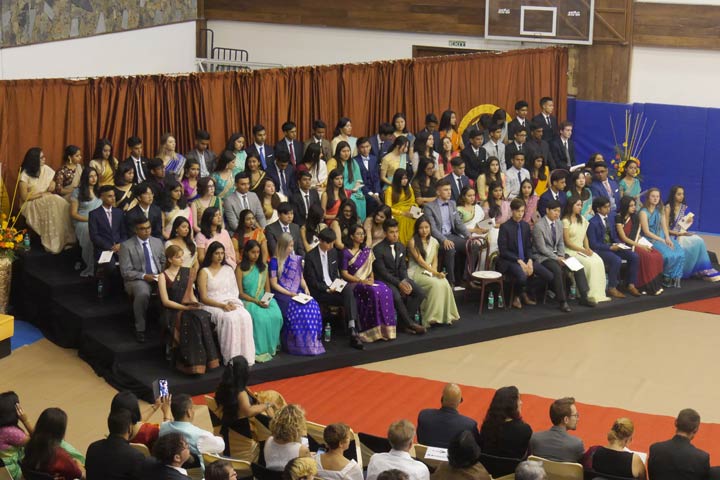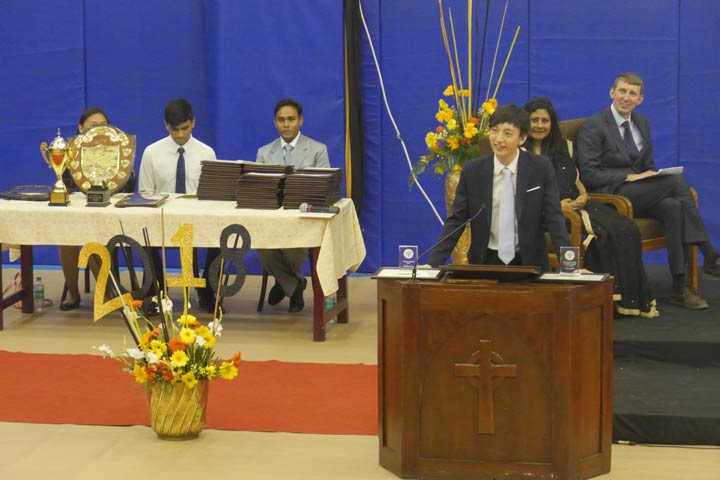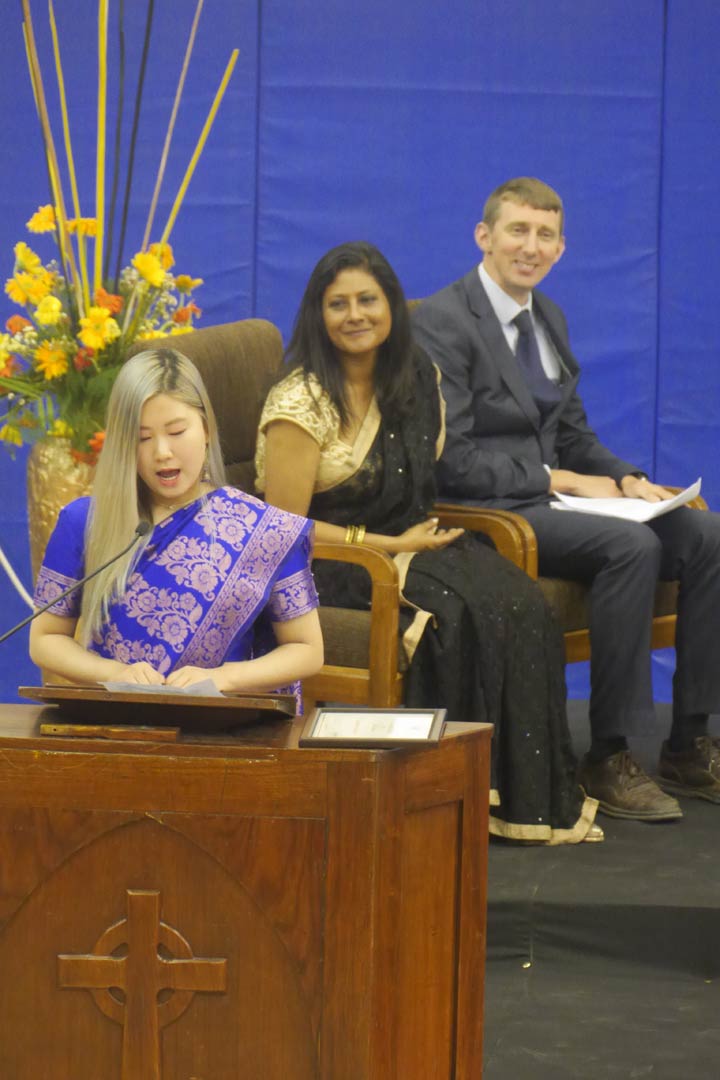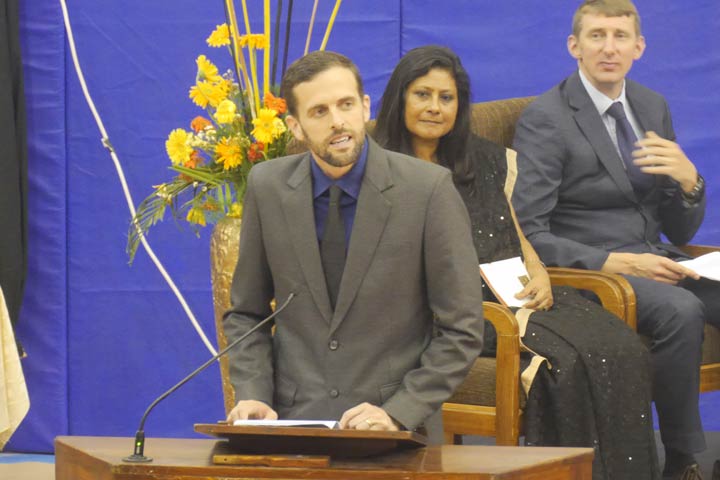
19 Dec Graduation speeches 2018
Key speeches from 2018 Graduation service, including from Valedictorian Hyechan Jun, Salutatorian Hah Yeon Lee, and guest speaker, former Head of High School, Jonathan Seefeldt ’00.

Valedictorian Hyechan Jun
To be perfectly honest, I have no idea what I’m doing up here.
Clearly I must have done something right to be standing in front of all of you as the brightest student of this class!
But what do I say?
Do I ramble on about philosophical analogies of our experiences at Woodstock and our hopes for the future?
Do I project my voice like a sports coach giving a moving, inspirational talk just before the big game?
Or do I make a joke to lighten this heavy, awkward mood I’ve managed to instill just a few seconds into my speech?
Yeah… I decided to do none of that.
I may be Valedictorian, but I’m still just a pessimistic worrywart whose knees are knocking together even as I speak.
I’ll just say what I really want to say.
The world is terrifying.
Crime, global warming, discrimination, bigoted idiots in positions of power, the looming threat of death at any moment.
It’s a nightmare out there.
And once we leave this school, we’re going to be thrust into that headfirst.
There won’t be the safe Woodstock bubble to protect us anymore.
There won’t be a community of people looking out for our wellbeing.
There won’t be adults to guide us in our time of need.
After all, we’re the adults now.
Some of us may not see that as a problem, but I certainly do.
What if we make mistakes we can’t fix?
What if we end up getting wrapped up in trouble just because we were in the wrong place at the wrong time?
What if we lose everything we’ve built up for years in an instant?
What if one of us… dies?
…
It’s depressing, isn’t it, just worrying about the future.
I’m sure all of you think I’m a strange Valedictorian to crush our spirits just as we leave.
So…
Class of 2018.
Prove me wrong.
Your lives are now yours to command, so get out there and make the most out of them.
Have fun, chase happiness, and show the pessimistic, nihilistic naysayers like me that the world isn’t as bad as we think.
Of course, the future will be full of obstacles.
You’ll all make mistakes, face embarrassment, maybe even end up in ruts where it feels impossible to climb back out.
But worrying about situations like that before they happen won’t do you any good.
As Jesus once said, “Who by worrying can add even a single hour to their life?”
If you have time to worry about a problem, start working on the solution.
If it’s a problem that you have zero control over, don’t waste your time worrying about it.
And when you’re at your lowest point, remember that there’ll always be someone to throw you a lifeline.
Whether it’s the people gathered here, the others you’ve met over the years, or the people you’ll meet in the future, there will always be someone there for you.
Humans are social creatures, after all.
And as a species prone to mistakes, it falls on all of us to overcome the challenges and make the best of our lives.
Together.
So prove me wrong, Invicta, and show me a future where even a pessimist like me can laugh without worry.

Salutatorian Hah Yeon Lee
Good morning! I warmly welcome families, students, board members and staff to this momentous celebration of Invicta’s graduation. I give special thanks to Jesus, my Savior and King, for everything I’ve experienced and achieved here in Woodstock. I thank my parents, my brothers – Hah Joon, Hah Min, Hah Rin, and Hah Jin – and my aunt who’ve always been loving and supportive. I’d also like to express my gratitude to all my teachers and friends who’ve shaped me into the person I am today. I’m truly grateful and honored at this very hour, but I definitely didn’t feel the same way two weeks ago.
I was stressed and frustrated at this last minute extra homework because I had absolutely no ideas for a speech. It was quite amusing how just because I scored the second highest GPA in class, I was automatically considered capable of crafting a speech and delivering it to an overwhelming guest. Mr Davies told me, “with great power comes great responsibility.” Being the second place responsible person today, I most happily complete my last homework in Woodstock because I just realized that for once, this work is not graded.
The last commandment in the Bible’s list of ten commandments reads, “thou shalt not covet thy neighbour’s goods.” To be honest, I didn’t understand why God would ask his people to follow this ridiculous law: Why couldn’t I want what my friends have? It’s completely natural for us to be greedy and want things. How is this a sin? But in my questions, I was missing the fact that a natural disposition of humans doesn’t always justify its ugly consequences.
Meeting people from all over the world, I practiced covetousness on a daily basis. I envied pretty clothes others wore, higher grades people got, friend groups to which I didn’t belong, people’s wealth, high social skills, physical appearances, musical talents, college destinations, and many more. I’m sure I’m not the only who’ve felt this way. It is true that we desire what we don’t have. And as a result, we lose gratitude to what is currently given to us. Interestingly, this behavior operates within a person’s life too.
I always wanted short hair when I had long hair and vice versa. When traveling back and forth from India to Korea, I missed being in India when I was in Korea and in Korea when in India. Likewise whether it is a desperate need for the wasted leisure time when procrastinating to write an essay or study for an exam, or looking through the pictures before weight gain and regretting having a huge meal, or wanting back a torn apart relationship, or even being overwhelmed by our postulations into the future, we place more importance to what is currently not in our hands. We tend to value the moments in life that the future or the past holds more than things embraced by the present which truly deserves our attention.
There are few questions I’d like to ask all of us present here: How long will you be caught up in the past and blankly watch this time allocated as our present slip away as another past, a regrettable past, or a missed opportunity? How long will you pretend like you know the future and waste the time in your hands with unguaranteed expectations or unchecked apprehensions? How can you achieve and live a balanced life if you only choose to consume things and moments that are pleasing? Our obsession with what we don’t have, is the reason why we fail to make the most of what we do have now and regret it in the future. The present situation — both good and bad, or what we perceive as good and bad — has a value in itself because it is yet another building block of our lives. It is natural that both blessing and punishment, happiness and grief, and many other conflicting qualities exist together. A sweet experience of success is not independent of an endurance of a bitter failure; the current happiness will be met with grief at its end; a delightful list of acceptances can be followed by hurtful rejections.
Today, I suggest you seize to desire things you don’t have but give your best in nourishing the present with your hard work so that your present self is not held back by the past or the future. We should no longer exhaust ourselves in merely desiring what we don’t have now; we should no longer squander the phase in life labeled as the present into a regrettable past; we should no longer desire an ideal future with a past filled with lacking effort or an empty present slipping through our fingers. We must awake and act for our cause at this very moment; we must learn from the past, exist and act in the present and lay the foundation for our future.
On this day, the class of 2018 stands in hope for the next journey. Whether it is starting a university or taking a gap year for a meaningful exploration of the world, this is the moment that embraces the most charming phase of life as we are no more high school kids but young adults who are now responsible for our own lives. Friends, I congratulate you for finally graduating high school. And I also advise you to make good choices in life and live the present wisely. God bless Invicta, Woodstock, and everyone here today. Thank you again for everything.

Guest speaker, former Head of High School, Jonathan Seefeldt ’00.
Memory – its pleasure, its pain, its purpose
Good morning. It’s a deeply felt privilege for me to be present for the graduation of the class of 2018 this morning. Returning to Woodstock is one of life’s great pleasures and I’d like to thank Dr Long and the Woodstock community for inviting me. A special greeting to all the proud parents, siblings, and extended family who have come from far flung corners of the world to be here today. Congratulations and condolences to my fellow teachers, counselors, and dorm parents here. You’ve made it through May intact—I think. I sense your conflicted, perhaps frazzled, hearts as you face the daunting gauntlet of farewells to beloved students and colleagues today. Thank you for your work. There is none more important in this world. Namaskar to our employees and community members. You’ve been here long before most us, you’ll be here long after we leave, thank you for your hospitality and patience.
[turning to the Class of 2018] And finally, finally—hello, old friends.
Mrs. Seefeldt sends her heartfelt greetings to you. This message is as much hers as it is mine.
It’s good to be back here in Wakanda. I’ve made the secret passage through Barlowganj, under the bridge near St. George’s and already can sense the healing power of vibranium, ah, vibrating through me. I feel a bit like I should be Michael B. Jordan; returning to Wakanda from the disgruntled ghettos of America to stir things up. By the way, that would make Dr. Long the Black Panther. Alas, I don’t have any of Michael’s muscles or bitterness.
I do, however, have memories. More than I can honestly handle. Of your journey as a class, of each of you.
It’s been somewhat of a restless year for Mrs Seefeldt and I. During one particularly restless evening, while I was staring blankly at the same-old screen of same-old Netflix titles, I just said to myself out of the blue, “remember Subho?”. I smiled very slowly. A vision of Subho came to me and interrupted the drone of a dreary American work week and I said, “oh yes, I remember Subho.”
The truth is my mind now on any night can replace that bland screen of Netflix shows with a far longer list of random, mostly wonderful, memories of Woodstock and Invicta.
Every so often, for example, I choose to replay Phunsok’s steal from Dipankar to win Swishathon two years ago. That’s one I’ve favorited on the permanent house of highlights feed in my head. I also occasionally replay specific jokes from Kahini’s mind-blasting career-launching talent show standup routine. I sing piraguas with Aryan about once a month. Just for giggles, I try to censor all the not-safe-for-work Invicta student monologues I heard while quietly eating baikaprow at Kalsang’s. I laugh as I recall a group of visiting students walk out of a performance of In the Heights saying, “arrey bhai, these actors are 100% hip hop”. I remain floored by the poetry I heard from Charis one afternoon at the CFI. I re-read the Hanumanchalisa I received from Vriti when I left.
The stream of memories I’ve lived with this year feels endless.
Perhaps it hasn’t quite hit you yet in the exciting blur of graduation week, but I imagine all of you are sitting with a far larger, even more chaotic database of memories today as well. Cluttering your head. Choking up your Instagram.
Commencement is usually a time for looking to the future. And the commencement speech is a time for some advice about that future. But the future is coming in a few hours and I’d rather we pause for a second. These are the last few minutes you will exist as a class. Graduation is not just an individual landmark or event. It is the end of a community as well. It’s the last time this particular community of teachers, dorm parents, staff and students will be together, it is the end of an era.
As you get in your separate taxis and board your separate planes, you will be transitioning from a time of experiencing Woodstock, experiencing Invicta, to remembering it. Living with a thousand memories, full of pleasure, full of pain.
What can do we do with all this? Well, first, expect some bumps along the road. People will tell you the first year away from Woodstock is difficult because of culture shock. That’s not why. You all are thoroughly adaptable, independent, and for better or worse, pretty accustomed to a global elite culture. No, it will be difficult because you have an unusual landslide of rich, thick memories to process. And memory is visceral. Your body feels it like the Picture Palace “7-D” theater experience.
Scientists have isolated the physical area of your brain that handles memory. Because of its unusual shape they call it the hippocampus, Greek for seahorse. When you see or hear certain things, like “remember Subho” your hippocampus triggers a flood of chemicals and sensations, images and emotions throughout your body. In other words, memory is a full body experience, is hard to control, and—if you’re graced with a healthy body—is not going anywhere for a long time. Memories can trigger physical pleasure and pain years and decades away from the actual experience. The isolated 24/7 experience of Woodstock only intensifies the number and depth of memories you’ve stored away. In short, you have a little Invicta seahorse in your head that’s going to be giving you full virtual reality experiences for years to come.
It can be hard to know what to do with all that emotion and re-experience, particularly during your first years away from here. Let me just give you two thoughts about how to tame the seahorse. First, don’t try to go back. Your time at Woodstock has come to end. I’m sure most of you at this point can’t wait for that. But as the weeks pass and you face some new challenges, don’t be surprised if you feel the deep urge to go back to what you think were simpler times here at Woodstock. Resist that urge. You have new friends to make, new challenges before you. Woodstock and Invicta will now exist and live with you primarily as memories, and that is a good thing.
Second, and most importantly, don’t be ashamed of your memories. Of their richness. Of their pain. Some of my best friends from Woodstock have occasionally expressed embarrassment that they still feel so strongly about their friends and their time here. You shouldn’t be. Many of you have quite literally grown up together. Many of your teachers, dorm parents, counselors and advisors have come to know you as they would their own children. These are the richest, deepest relationships life gives us. Treasure them. Honor them. They are hard to come by.
Most cultures in the world, prior to modern global capitalism, have centered on memory. Most of what we have come to call religion or tradition, is in fact the practice of remembering, of living according to our collective memory. Stupas, dargahs, samadhis, the Quran, the Mahabharat, crucifixes—these are all ways of remembering. Of ordering our lives based on life-altering relationships from the past. In the years to come, don’t be ashamed of missing and cherishing the friends sitting next to you. On Instagram, on Facebook, in your heads, hearts, and hopefully at formal and informal reunions for years to come. It’s how we were made to live. Woodstock, for better or worse, has given you an unusual abundance of these relationships.
But still, is there any importance to all of this besides just personal advice on how to handle the emotions of the coming year? I say without hesitation ek dum, phataphat, 100% yes. Valuing, savoring, centering, mastering memory is a lost art whose absence is rotting our world more rapidly than we realize. We live in a world that is forgetting—both the good and the bad of what has come before. Ghosts of fascist pasts are returning to Europe and the USA. In India, we’re losing languages, forests, even memories of breathable air, rivers we can bathe in, millennia of dharm and tehzeeb—all to the forces of colonialism, modernity, and a new global cult of unabashed individualistic greed whose gods are the holy male trinity of Mark Zuckerberg, Elon Musk, and Jeff Bezos, whose scripture is Steve Jobs’ biography, and whose unspoken creed is get rich by all means, love yourself in all things, forget all else. The world is blowing up Bamiyan Buddhas and Syrian Palymras right and left, figurative and real, leaving modern life a barren, boring, broken place.
No, it’s no small thing to be someone who cultivates and honors memory. Celebrating, cherishing the positives. Remembering, processing, learning from the more painful parts of our past. The modernizing world may sneer at you as impractical, archaic, or as we sometimes say at Woodstock ‘too senti’. I would say carefully remembering where you came from, where you’ve been, who has taught you, who has shaped you, who you’ve loved, who you’ve hurt, your moments of joy, of pain—remembering all of this will not only tell you where it would be wise to go next but, quite simply, makes life worth living, savouring.
In short, Invicta, keep that little seahorse in your heads healthy and active. Enjoy these last few moments of the Woodstock experience then look forward to visiting a new Picture Palace in your mind. You’ve been gifted a lifetime of Invicta-tinged memories that can guide your way through the coming challenge of college, career, and in all seriousness, saving the planet.
Love to you from Mrs Seefeldt and I. You will not be forgotten.






No Comments